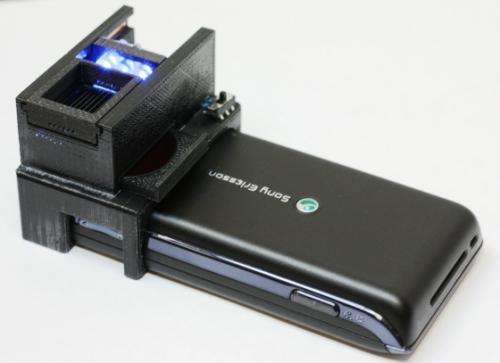Engineers create cell phone-based sensor for detection of E. coli

(PhysOrg.com) -- Researchers from the UCLA Henry Samueli School of Engineering and Applied Science have developed a new cell phone–based fluorescent imaging and sensing platform that can detect the presence of the bacterium Escherichia coli in food and water. The engineers combined antibody functionalized glass capillaries with quantum dots (semiconductors often used for medical imaging) as signal reporters to specifically detect E. coli particles in liquid samples using a lightweight, compact attachment to an existing cell-phone camera.
Using battery-powered, inexpensive light-emitting diodes (LEDs), the researchers can excite/pump labeled E. coli particles captured on the capillary surface; there, emissions from the quantum dots can be imaged with the cell-phone camera, using an additional lens inserted between the capillary and the cell phone.
The cost-effective cell-phone attachment acts as a florescent microscope, quantifying the emitted light from each capillary after the specific capture of E. coli particles within a sample. By quantifying the florescent light emission from each tube, the concentration of E. coli in the sample can be determined.
E. coli can easily contaminate food and drinking water. It poses a significant threat to public health, even in highly developed parts of the world, and causes a large number of hospitalizations and deaths every year. As few as 10–100 E. coli particles can kill the cells of the intestinal lining, destroy the kidneys and cause blood clots in the brain, as well as seizures, paralysis and respiratory failure.
This study illustrates the promising potential of a cell phone–enabled, field-portable and cost-effective E. coli detection platform for the screening of both water and food samples.
Authors of the research include UCLA electrical engineering postdoctoral scholar Hongying Zhu; UCLA electrical engineering undergraduate student Uzair Sikora; and UCLA associate professor of electrical engineering and bioengineering Aydogan Ozcan. Ozcan is also a member of the California NanoSystems Institute at UCLA.
More information: The research is published in the peer-reviewed journal The Royal Society of Chemistry and is available online at pubs.rsc.org/en/content/articl … g/2012/an/c2an35071h
Provided by University of California Los Angeles

















